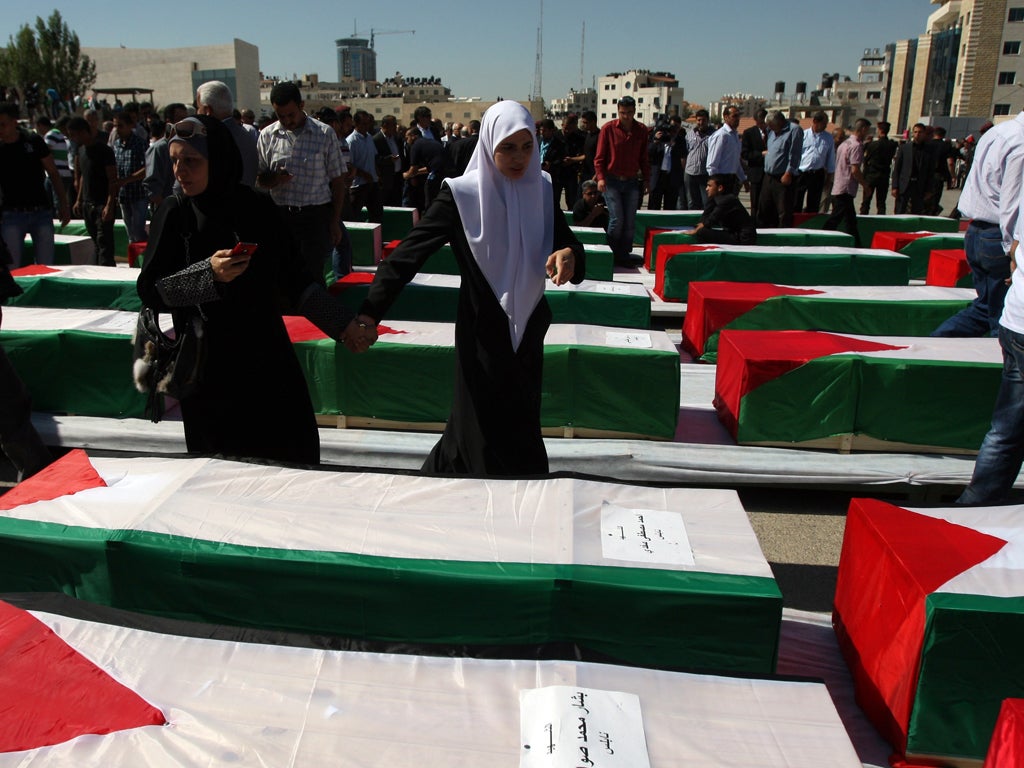Israel returns remains of Palestinians in bid to 'get peace process back on track'

Your support helps us to tell the story
From reproductive rights to climate change to Big Tech, The Independent is on the ground when the story is developing. Whether it's investigating the financials of Elon Musk's pro-Trump PAC or producing our latest documentary, 'The A Word', which shines a light on the American women fighting for reproductive rights, we know how important it is to parse out the facts from the messaging.
At such a critical moment in US history, we need reporters on the ground. Your donation allows us to keep sending journalists to speak to both sides of the story.
The Independent is trusted by Americans across the entire political spectrum. And unlike many other quality news outlets, we choose not to lock Americans out of our reporting and analysis with paywalls. We believe quality journalism should be available to everyone, paid for by those who can afford it.
Your support makes all the difference.Israel sought to project its return of the remains of 91 Palestinian militants to the West Bank and Gaza yesterday as a "confidence building measure" that it hoped would "help to get the peace process back on track".
The declaration from the office of Prime Minister Benjamin Netanyahu came 24 hours after his Defence Minister, Ehud Barak, said the newly broadened coalition provided a rare opportunity for a "diplomatic process".
In terms which were given short shrift by both right wing members of Israel's coalition and the Palestinian Authority, Mr Barak also floated either an "interim agreement" or "unilateral action" to withdraw from parts of the West Bank if a full agreement could not be negotiated. Yesterday's handover was part of the agreement under which around 1,500 Palestinian prisoners ended their hunger strike a fortnight ago. But it came amid mounting concern over the condition of two prisoners still on hunger strike, including Mahmoud Sarsak, 25, who has refused food for 74 days. He was detained without trial under Israel's Unlawful Combatants' Law while still a member of the Palestinian national football team. The prisoners' rights organisation, Adameer, said that Mr Sarsak had not been included in the agreement, which promised that detention would not be extended without fresh evidence.
In Ramallah, boxed remains of 80 militants – including at least 20 suicide bombers who killed over 200 Israelis between 1995 and 2006 – were transferred to coffins draped with Palestinian flags in the silent presence of the Palestinian President Mahmoud Abbas. The prisoners' families then came forward to claim the bodies.
In Gaza, the remains of the other 11, who had also been interred in an Israeli military cemetery for "enemy combatants" in the West Bank, were transferred from the Erez checkpoint in a 12-vehicle Hamas convoy to Gaza City. They included Reem al-Reashi, a Hamas suicide bomber who blew herself up at an Israeli army checkpoint in 2004, killing four soldiers. Although the idea floated by Mr Barak of unilateral withdrawal from parts of the West Bank has traction among some other Israeli politicians, Mr Netanyahu has made no comment, instead calling on Mr Abbas to "give peace a chance" by returning to negotiations.
The Prime Minister's spokesman, Mark Regev, said: "Israel is ready for the immediate resumption of peace talks without any preconditions."
But Mr Abbas, deeply sceptical of a positive outcome, has been demanding a halt to Jewish settlement expansion before returning to talks.
Join our commenting forum
Join thought-provoking conversations, follow other Independent readers and see their replies
Comments